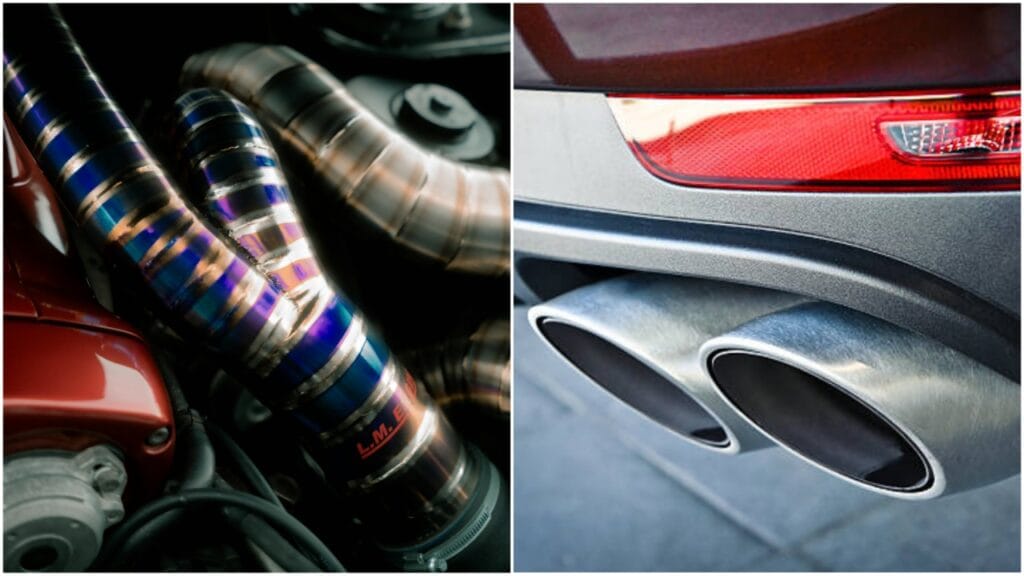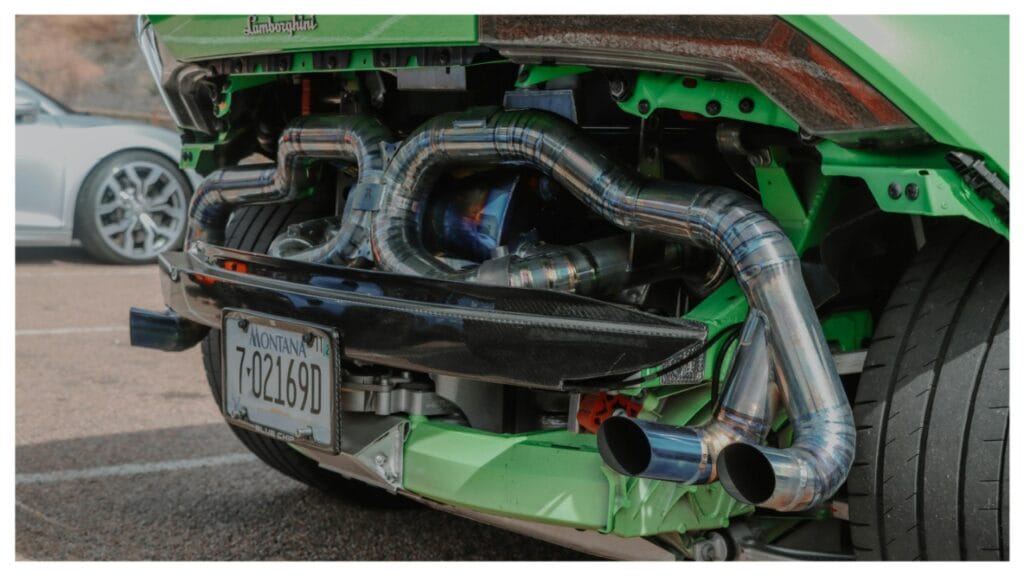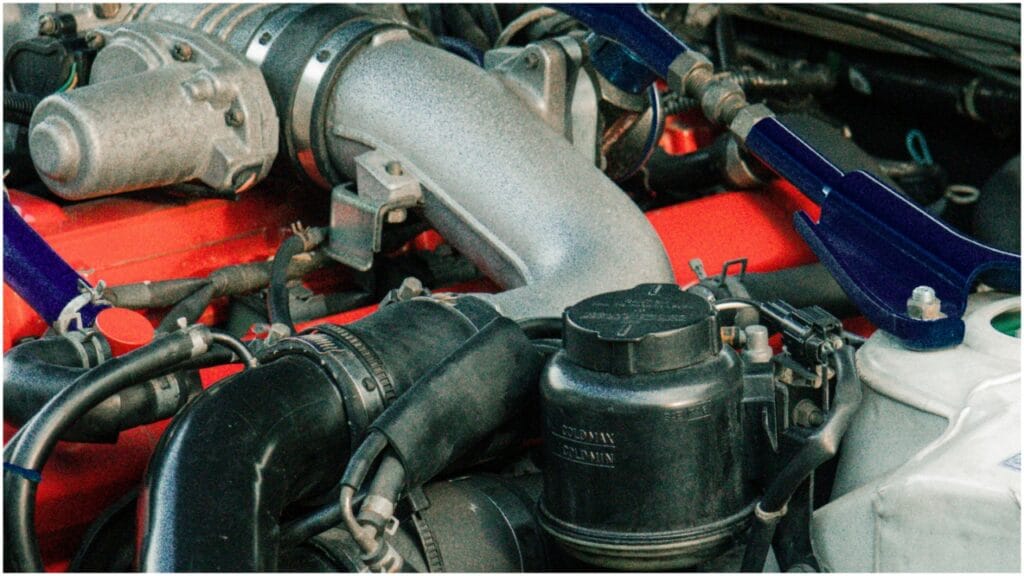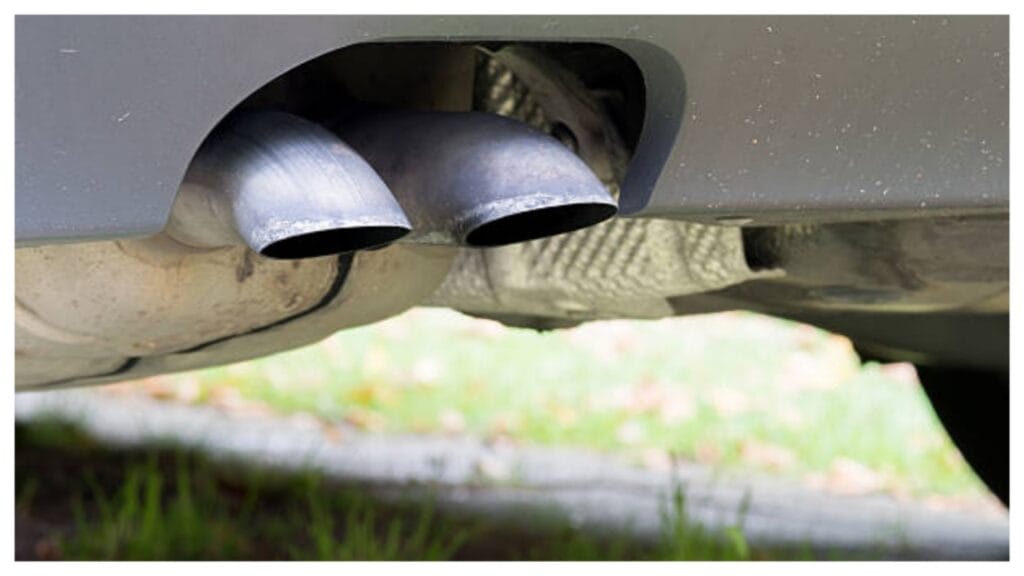You’ll need to manipulate how fuel burns in your engine to get that satisfying exhaust-popping sound. One way is to add a tune. This tune allows unburnt fuel to ignite in the exhaust system, causing pops or crackles when you lift off the throttle. Adjusting your car’s air-fuel mixture can also help.
Running it richer burns leftover fuel in the exhaust. Another way is to upgrade to a performance exhaust system, which amplifies the pops. Remember that these modifications impact emissions and can be illegal in some places.
It’s best to check your local laws before making any changes. Also, too much popping can damage your exhaust or engine over time, so moderation is key. A professional tune or installation will help avoid problems while getting that sweet sound.
Let’s explore the pros and cons of exhaust pops. More importantly, you can learn to coax that satisfying “bang” from your ride.
What is Exhaust Popping?
An exhaust pop results from unburned fuel igniting inside your exhaust pipe. Sounds dangerous. It can be, but if done right, it’s controlled chaos.
When your engine doesn’t burn all the fuel in the combustion chamber, some escapes into the exhaust. As it leaves, it ignites due to heat, and a popping sound is born.
You hear this in cars with tuned engines, turbochargers, or fancy aftermarket exhaust systems. But it’s not just for show-offs with supercars. Even your regular old car can get into the action with some tweaking.
How Do You Get That Pop?

The easiest way is tuning. Many cars, especially newer ones, have computers that control how the engine burns fuel. You can adjust the air-fuel ratio.
Also, try changing the ignition timing to get that unburnt fuel to ignite ideally. You’re telling your car, “Hey, let a little bit of fuel through and make some noise.”
Next up: upgrading your exhaust. You can always go the mechanical route if you want to make sure the computer runs smoothly. Aftermarket exhaust systems are designed to let your engine breathe a little easier.
Less restriction means more airflow, and with that extra air comes the ability to create pops and crackles. Some exhaust systems even come with “pop and bang” features. After all, everyone wants to have fun with their car.
Then, there’s the manual method—revving the engine at the right moment, followed by sudden deceleration. It’s less consistent, but that pop is like a little party in your exhaust when you do it right.
The Pros of Having a Popping Exhaust
There’s something deeply satisfying about rolling down the road with an exhaust that crackles and pops like it’s alive. If you love your car, you want it to sound as fierce as it feels. Here’s what’s in it for you.
For starters, it’s a head-turner. If you’re the type who loves a little attention, popping exhausts are your ticket. You’ll find people craning their necks to see what beast makes all that noise.
It gives your car personality, turning something ordinary into something that sounds untamed.
Another perk? It just feels good. Imagine cruising down the street with the windows down and music low.
Now and then—pop, pop—you get a little reminder that you’re in control of something powerful. It’s an adrenaline boost, even when you’re driving slow.
The Cons of Having That Sound

As cool as exhaust pops sound, they’re not without their downsides. And if you’re thinking about modding your car for this effect, you’ll want to consider the trade-offs.
For one, it’s not exactly subtle. That sound? It’s loud. And it can get annoying, especially if you’re driving through quiet neighborhoods or residential areas.
You love it, but your neighbors? Not so much. Prepare for a few dirty looks, maybe even a call or two to noise control if things get too wild.
Let’s also discuss engine wear and tear. If you constantly drive your car in a way that encourages popping, you put extra strain on your exhaust system.
You also stress the engine itself. Unburned fuel is fun for sound effects, but it’s not the healthiest thing for your car long-term.
There’s also the law to consider. Depending on where you live, making your car loud enough to pop can result in a ticket.
Some areas have noise ordinances or emissions standards that don’t take too kindly to custom exhaust setups. Keep that in mind before you start ripping through the streets.
Finally, the environmental side. A popping exhaust is the sound of inefficiency. Unburned fuel means more pollutants hitting the atmosphere.
It’s a small thing in the grand scheme but something to consider if you’re trying to be eco-conscious.
Should You Do It?
The decision is yours. Do you want that relaxed, aggressive sound? Are you willing to deal with the extra attention (both good and bad), potential mechanical issues, and possible legal consequences? For some, it’s worth it for the pure joy and thrill. For others, the cons outweigh the benefits.
If you’re leaning toward yes, make sure you do your homework. Only slap on an exhaust mod or tweak your car’s computer while knowing what you’re doing.
Talk to professionals, get advice from people who’ve done it before, and be safe about it. You want that pop but don’t want it to come at the cost of damaging your car or wallet.
Exhaust Pop Culture: More Than Just Noise

It’s a part of tuning culture. It’s tied to how the car is built, not just how it sounds. They’re chasing the perfect harmony of performance and sound.
The car speaks a language only the driver and other enthusiasts understand.
You find yourself talking to strangers about their setups. You trade insights on how to get the best pop without sacrificing performance.
Another factor to consider is the influence of media. Movies, games, and social media have amplified the love for pop-and-crackle cars.
You hear it in films, see it in video games, and it feeds into the desire to make your car sound like it’s ready for the next big race.
This sound also affects how others perceive the car’s power. It’s a psychological thing. Loud cars, especially with exhaust pops, are often assumed to be faster, even if they aren’t.
The noise gives an impression of raw energy, even if the actual engine performance is modest.
Final Thoughts

There’s no denying the allure of that popping exhaust. It’s like the car equivalent of swagger—bold, brash, and not for the faint of heart.
But as with anything extraordinary, it comes with its pros and cons. If you’re ready to turn heads, then go for it. Feel the rush of adrenaline every time your car gives a little pop.
FAQ’s
How to make your car exhaust pop?
Making your car exhaust pop is like giving it a voice with attitude. It’s all about controlling fuel and airflow. First, consider a tune-up. Many modern cars can be tuned with software to adjust fuel mapping.
This makes the engine dump extra fuel into the exhaust, igniting and creating satisfying pops. A straight-pipe exhaust or a less restrictive aftermarket system can amplify the sound.
These systems let unburned fuel escape more freely and combust in the tailpipe. Revving your engine and quickly lifting off the throttle can also trigger the popping effect.
But don’t overdo it—your engine might not love the drama as much as you do. Remember, this trick works best on cars with turbochargers or performance setups. Always check your local laws before modifying your exhaust.
Why does a car exhaust pop?
A car exhaust pops because of unburned fuel igniting in the exhaust system. This happens when the combustion process inside the engine isn’t fully complete.
The leftover fuel escapes into the exhaust, which meets hot gases or air. The heat causes it to ignite, creating a popping sound. Several factors can lead to this. A rich air-fuel mixture is one of the most common reasons.
The engine can’t burn it all when there’s too much fuel and not enough air. Faulty spark plugs or lousy ignition timing also contribute.
They fail to ignite the fuel inside the engine, sending it unburned to the exhaust. Exhaust leaks can make the problem worse. Extra air entering the system disrupts the balance, leading to pops.
Popping sound from exhaust?
This sound often happens because of unburned fuel igniting in the exhaust. The cause? It could be a rich air-fuel mixture. This happens when there’s too much fuel and not enough air in the combustion process.
Faulty spark plugs or ignition timing issues can also play a role. They prevent the fuel from burning completely in the engine. When air sneaks into the system, it disrupts the balance, leading to pops.
High-performance cars with tuned exhaust systems sometimes pop intentionally, but for regular vehicles, it’s a problem. Start by checking the spark plugs and ignition system.
If they’re fine, inspect the fuel injectors or carburetor settings. If you’re unsure, a mechanic can diagnose it quickly. Ignoring the sound can lead to bigger issues over time. Excessive popping might damage the exhaust or catalytic converter.
How to fix exhaust popping?
Exhaust popping happens when unburned fuel ignites in the exhaust. A few things can cause it, including an air leak, a rich fuel mixture, or even a lousy exhaust gasket.
To fix it, first, check the exhaust system for leaks. Pay close attention to the joints and connections where leaks are common. If you find any cracks or loose connections, seal them or replace them.
Next, check the air-fuel ratio. If the engine is running too rich, adjust it to improve combustion. A simple tune-up can make a difference here. Lastly, inspect the exhaust gaskets for wear or damage.
Replacing faulty gaskets can help stop popping sounds. After all these checks, it is worth visiting a professional if the popping continues.
Sometimes, the issue can stem from deeper engine problems. Solving it early will prevent more significant problems later.
Car popping noise from the exhaust!
A popping noise from your car’s exhaust usually shows unburned fuel igniting the engine. It often happens during deceleration or when you let off the gas.
Common causes include an air leak in the exhaust, a fuel mixture that’s too rich, or a malfunctioning spark plug. Check for leaks, especially around the exhaust manifold and pipe joints.
Tighten any loose bolts or replace damaged parts. Next, check the air-fuel mixture. If it’s too rich, excess fuel escapes into the exhaust. Adjusting the fuel settings can help.
Also, check the spark plugs; a misfire can send unburnt fuel through the exhaust, causing that popping sound.
If none of these fixes work, it is best to consult a mechanic. They can pinpoint any more profound issues that are causing the noise.
The car made a pop sound and wouldn’t start.
If your car made a pop sound and now won’t start, it is a sign of a severe issue. That pop shows a backfire when unburnt fuel ignites outside the combustion chamber.
This is caused by a timing issue, such as a bad spark plug or a problem with the fuel system. First, check the spark plugs to see if they’re worn out or damaged.
A faulty plug can cause a misfire, leading to that pop sound. Next, inspect the timing belt or chain. If it’s off or broken, the engine can’t run properly.
Lastly, check the fuel system. If fuel isn’t reaching the engine, the car will not start. If these aren’t the issues, having a mechanic take a look is best. Something more serious, like an internal engine problem, could be the culprit.
Loud pop under the hood?
A loud pop under the hood can be alarming. It usually indicates a problem with your engine or intake system. One common cause is a backfire, which occurs when fuel combusts outside the chamber.
This can be due to a timing issue, a faulty spark plug, or a lean air-fuel mixture. Another possible cause is a blown intake hose or gasket. When these parts fail, air can escape, making a loud popping sound.
It can also be something more serious, like a broken belt or a failing part inside the engine. Start by checking for visible damage, such as cracked hoses or loose connections.
If you don’t see anything obvious, it’s best to have the car checked out by a professional. Ignoring it leads to more significant, more expensive issues later on.
Conclusion
The exhaust pop is more than just a noise—it expresses a passion for cars and driving. It connects enthusiasts, adds personality to vehicles, and enhances the driving experience.
But with that comes responsibility. Not everyone will love the noise. If things go too far, your car and wallet could be damaged.
It’s essential to strike a balance, ensuring the excitement doesn’t lead to unwanted consequences.
If you’re willing to embrace the ups and downs, the exhaust pop can turn an ordinary ride into something memorable.
It’s not just about standing out—it’s about making the road more exciting, one crackle at a time.

